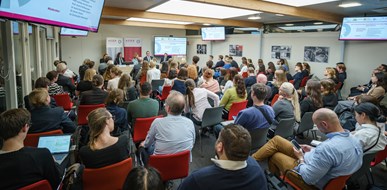[New video] Pursuing accountability for the crime of aggression against Ukraine
Published 24 October 2023
@Hilko Visser - Participants during the lecture on the different mechanisms to pursue accountability for the crime of aggression against Ukraine.
The recording of the SCL Lecture “Pursuing accountability for the crime of aggression against Ukraine” is out now. During the lecture, which was held last month, international legal experts discussed the different mechanisms to pursue accountability for the crime of aggression against Ukraine, including the establishment of a special tribunal. What would be the exact model this tribunal could and should take? Watch the video now.
On 4 May 2023, when he visited The Hague, Ukrainian President Zelenskyу spoke about the pursuit of accountability for international crimes committed in Ukraine. He then remarked: “Only one Russian crime led to all of these crimes: this is the crime of aggression, the start of evil, the primary crime. There should be responsibility for this crime.”
Even though Ukraine can prosecute individuals for the planning, preparation or waging of an aggressive war or armed conflict, or conspiring for any such purposes, as well as conducting an aggressive war or aggressive military hostilities (Article 437 of the Criminal Code of Ukraine), the framing of this provision, and the issue of immunity ratione personae (immunity for heads of state and other high-ranking officials) would make prosecution in national courts of high-level foreign officials, such as Putin, complicated.
Moreover, the ICC does not have jurisdiction over the crime of aggression in this situation as both Russia and Ukraine have not ratified the Rome Statute, and the UN Security Council will not refer the situation to the ICC because of Russia’s veto.
As a result of this, discussions on establishing a tribunal for the crime of aggression have been gaining momentum. One of the topics under discussion, among both politicians/policy makers and academics, is the exact model this tribunal could and should take.
For example, during the same visit to The Hague at the beginning of May, President Zelenskyy clarified he wanted a fully international criminal tribunal and not a hybrid/internationalised model (a court rooted in Ukraine’s judicial system, but including international elements as well), the model advocated for by U.S. Ambassador-at-Large for Global Criminal Justice Beth Van Schaack a few days earlier. During the lecture on 21 September 2023, these different models as well as any other mechanisms that could be considered in pursuing accountability for the crime of aggression were explored. Watch the video on our International Crimes Database.
Dr Christophe Paulussen (Moderator and coordinator, Asser Institute)
H.E. Mr. Oleksandr Karasevych (Ambassador of Ukraine to The Netherlands)
Dr Anton Korynevych (Ambassador-at-Large of the Ministry of Foreign Affairs of Ukraine)
Prof. Larissa van den Herik (Grotius Centre for International Legal Studies at Leiden University)
Prof. André Nollkaemper (Amsterdam Law School, University of Amsterdam)
Dr Astrid Reisinger Coracini (Dept. of European, International and comparative law, University of Vienna).
Dr Owiso Owiso (International lawyer and independent consultant)
This supranational criminal law (SCL) lecture was co-organised by the Ukrainian Embassy in The Hague, the Asser Institute’s International Humanitarian and Criminal Law Platform, and supported by The Hague Municipality.




